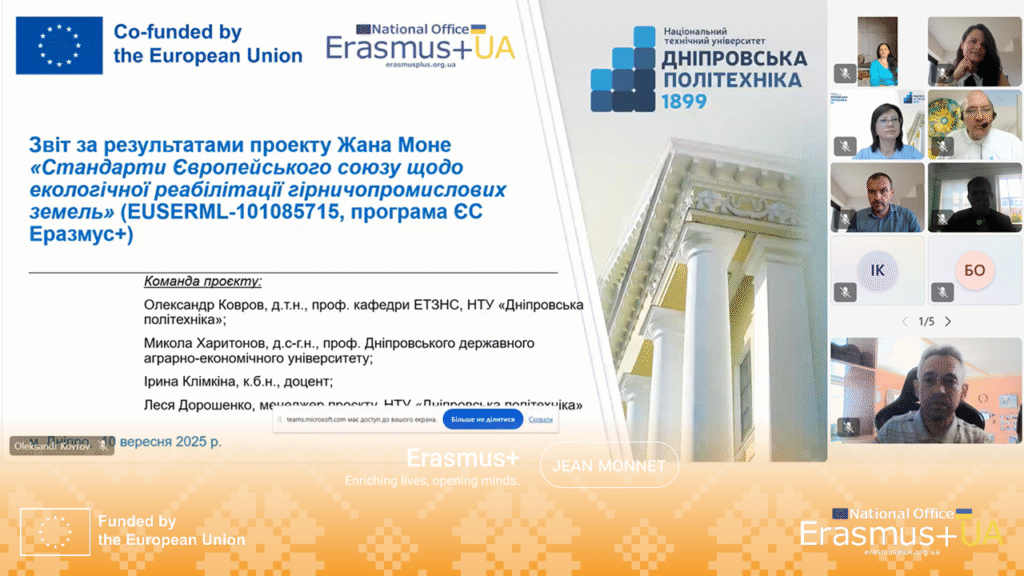Dnipro University of Technology presented the key results of the Jean Monnet project of the EU Erasmus+ Program “EU Standards for Environmental Rehabilitation of Mining Lands” (EUSERML) (10.09.2025, online)
On September 10, 2025, the Dnipro University of Technology within the framework of the EU Erasmus+ Program held a final event on the completion of the Jean Monnet project “EU Standards for Environmental Rehabilitation of Mining Lands”, at which the results of the work, key developments and prospects for the development of the environmental sphere were presented. The event was held within the framework of the implementation of the project of the same name.
The event was attended by about 40 participants – representatives of the scientific and pedagogical staff and students of the university and other interested parties of the project.
During the event, representatives of the project team made presentations on the results. The speakers focused on the developed and implemented training courses, lectures, discussions, conferences and workshops, and published scientific products.
The event was addressed by Petro Krainik, a representative of the National Erasmus+ Office – Ukraine (EU funded project), who in his speech highlighted such issues as: ensuring synergy and inter-project cooperation, mutual exchange of experience, the importance of quality completion and timely reporting of the project, communication with the EACEA project officer, spoke about the systematic approach to the implementation of existing projects and the preparation of new applications, and communication at the horizontal level at the university.
Additionally:
PROJECT NAME: EU Standards for Environmental Rehabilitation of Mining Lands.
The goal of the proposed project is based on the integration of the best practices of the European Union in the field of environmental rehabilitation of lands affected by the mining industry. This topic is very actual for Ukraine which faces upcoming challenges related to the closure of coal mines in Western Donbas and relevant development of the surface mining industry. Along the life cycle of mining enterprises, the adjacent lands accept the powerful environmental impact in the form of contamination by heavy metals. There is an urgent need to establish prerequisites for training a new generation of young researchers and experts to cope with these problems by accepting the best available technologies used in the EU. The project includes the development of a comprehensive academic Module “Environmental Rehabilitation of Mining Lands” (ERML) for students that consists of 3 Master courses based on directives and standards of the European Union in the field of Land management, environmental impact assessment (EIA) and ecological engineering technologies in mining.
The project tasks are conceived as the logical stages of transferring advanced knowledge and the best existing practices in the field of ERML, EIA from EU to Ukraine via academic courses, research work, and dissemination activities, and included the following:
- To develop the comprehensive academic Module “Environmental Rehabilitation of Mining Lands” (ERML) consisting of 3 substantially revised Master courses for young specialties and experts in the field of Ecology and Environmental Engineering;
- To launch research work focused on EU approaches and strategies in the field of Environment, Sustainability the ERML issues;
- To facilitate the propagation of EU standards through collaboration with EU partner Universities, Ukrainian industries, local authorities, and the public sector.
The ERML Module will become a bridge between DUT and European universities extending principles of lifelong education, diversity, and partnership. Funded by the European Union. Views and opinions expressed are however those of the author(s) only and do not necessarily reflect those of the European Union or the European Education and Culture Executive Agency (EACEA). Neither the European Union nor EACEA can be held responsible for them.

